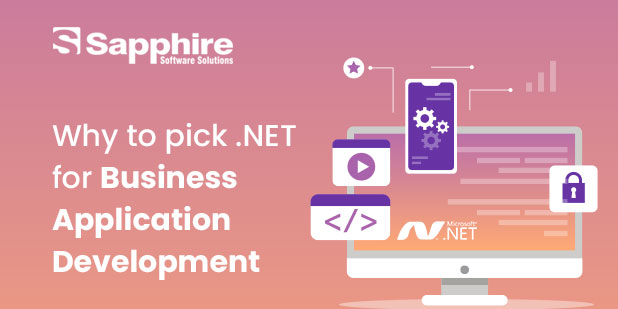The .NET Framework is a programming paradigm that enables the creation and execution of software programs for Microsoft Windows, Windows Server, Windows Phone, Microsoft Azure, and XML Web services. Microsoft created it, and it is based on Microsoft’s Windows operating system. The .NET Framework consists of the Framework Class Library (FCL) and the Common Language Runtime (CLR), which provide language support for a wide range of computer languages.
It created this Framework to address several application development challenges, including lengthy development periods, the difficulty of updating programs rapidly, the high total cost of ownership of software, and simplicity of deployment.
Features of Common Language Runtime (CLR):
Manages memory, threads, and code execution, plus compiles and does many system operations.
Secures code access
Ensures the resilience of the code by utilizing a stringent type-and-code-verification architecture referred to as the common type system (CTS).
Just-in-time (JIT) compilation enables all managed code to be executed in the system’s native machine language. At the same time, the memory manager eliminates the possibility of fragmented memory and boosts memory locality-of-reference, which improves speed.
Many server-side programs, such as Microsoft SQL Server and Internet Information Services, may be used to host the runtime (IIS).
Features of Framework Class Library (FCL):
This package contains a variety of standard class libraries. These class libraries handle a wide range of common activities, such as graphic rendering, database integration, and XML document management.
A set of reusable types that are inextricably linked to the Common Language Runtime
An object-oriented class library handles common programming activities such as string management, data collecting, database connectivity, and file access.
Advantages of .NET for Business Application Development
The return on investment determines the success or failure of any business or product on the market. Calculating ROI requires an understanding of both the magnitude of earnings and the time required. The following properties of.NET help reduce development and operating costs for an effective information technology company.
1. Reduced Coding and Increased Code Reuse:
This Framework is based on object-oriented programming, which removes extra code and requires developers to write less code. .NET is composed of reusable code and many reusable components. Developing for a shorter time leads to a reduced total development cost.
2. Deployment:
The .NET framework simplifies post-development deployment with capabilities like no-impact apps, private components, restricted code sharing, side-by-side versioning, and partially trusted code. The code execution environment enables secure code execution, resulting in fewer conflicts during software deployment and versioning and decreased performance issues associated with scripted or interpreted environments.
3. Reliability:
.NET has been used to create hundreds of apps since its 2002 release. It also performs well on Microsoft® Windows ServerTM 2003 and Windows 2000 Server.
4. Security:
ASP. NET provides better application security through Windows confirmation and configuration for online applications written with ASP. NET. Managed code and the CLR provide security capabilities like role-based access control and code access control.
5. Cross-Platform and Cross-Language Development:
.NET enables developers to create programs for a desktop, a browser, a mobile browser (such as on a cell phone), or a PDA. .NET is marketed as a language-independent framework, which means that it may be developed in a variety of compatible languages, including C #, managed C++, VB.NET, Visual COBOL, IronPython, and IronRuby.
6. Application to Service-Oriented Architecture:
.NET is frequently used to implement Web Services, a component of an SOA approach. Web Services enable applications written in disparate programming languages or platforms to communicate and exchange data using common Internet protocols.
7. Integration with Legacy Systems:
Because .NET is capable of processing all sorts of XML documents and writing any file format with ease, numerous integration paths are available.
Types of applications that we can create with .NET
Desktop applications that include:
o Windows GUI application or Windows Forms applications
o Product/inventory applications
o Accounting applications
o Applications for value chain/supply management
o Warehousing applications using hand-held devices
o Windows services applications
Web-based applications including:
o XML Web services
o Websites
o Applications requiring integration with partners through the Internet
Applications on embedded systems like:
o PDA (hand-held) applications
o Applications for mobiles
Others including:
o Windows Presentation Foundation (WPF) applications
o Use of Windows Communication Foundation(WCF) in service-oriented applications
o Console based applications
o ASP.NET applications
o Applications employing Windows Workflow Foundation that utilize the Workflow functionality
Microsoft has announced the release of the .NET Framework 4.5.2 and 4.6 Preview.
.NET Application Development Services
We leverage our technical knowledge to deliver custom .net application development services that help businesses achieve their goals.
- Modernization of Applications
Our experienced team will seamlessly update or upgrade your current technology stack to improve speed, usability, and performance. - Development of Enterprise Applications
Our experienced.Net team can help you develop enterprise-grade online applications that are fast, secure, and scalable. - Development of Mobile Applications
Our .Net specialists create Windows desktop applications and cross-platform mobile applications that maximize engagement, interaction, and scalability. - Integration with Third Parties
Our .Net experts will manage your integration requirements with other Microsoft and non-Microsoft systems. - ASP.NET Development on a Custom Basis
Our ASP.NET development team adheres to industry best practices while developing robust backends for online, mobile, desktop, and Internet of Things apps. - Microsoft Azure Application Development
To ensure high availability and dependability, our .NET developers create highly scalable and secure applications on Microsoft Azure. - Migration
Our .NET specialists will convert your existing application to .NET or will move your application from the old ASP.NET Framework to the cross-platform ASP.NET Core. - Optimization of Performance
Our professional team will optimize the performance of your.net application through code review, crash data analysis, and performance audits. - Assistance & Maintenance
Our ASP.NET maintenance staff will assist you in keeping your application current and safe by performing necessary updates, upgrades, and fixes.
We are a .net application development company with years of expertise in developing entertaining and effective online applications using a strong framework and a rich API set. If you require .net application development services, we can serve as your finest DOT NET development business. Our DOT NET development team possesses a wide range of skills and can tackle any application development project you may require.
Our custom .net application development services will fit your needs, whether public or private cloud or a PC or a smartphone device. We make every effort to keep our services as inexpensive as possible while at the same time making sure they’re of the highest possible quality. The balanced mixture of quality, dependability, and efficiency allows us to exceed your expectations in our end product.





































